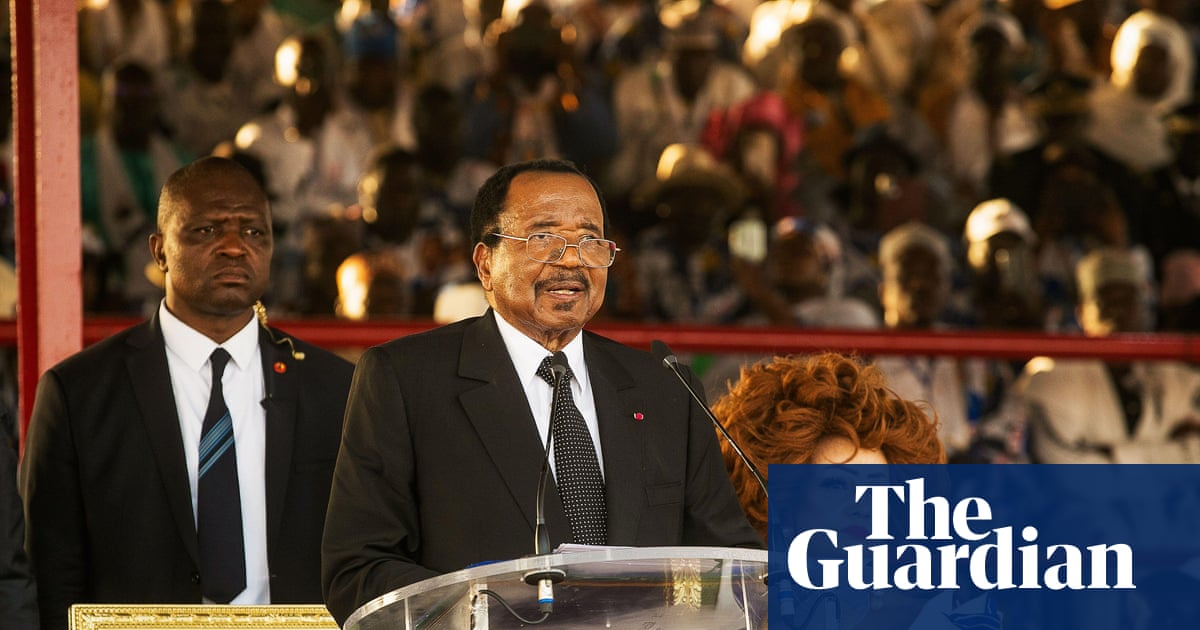Cameroon’s 92-year-old president set for another term as country goes to polls | Cameroon
Cameroon goes to the polls on Sunday for a presidential election with Paul Biya, already the world’s oldest head of state at the age of 92, the favourite to win an eighth term in power in the central African country. A fractured opposition of 11 candidates is standing against Biya, who, despite his advanced age…
Cameroon goes to the polls on Sunday for a presidential election with Paul Biya, already the world’s oldest head of state at the age of 92, the favourite to win an eighth term in power in the central African country.
A fractured opposition of 11 candidates is standing against Biya, who, despite his advanced age and declining health, has dismissed calls for him to retire.
“Our candidate is in great shape … and he is capable of continuing what he has started,” Grégoire Owona, the labour minister and the ruling party’s secretary general, told French radio RFI in late September.
Many of the 7.8 million Cameroonians eligible to vote can remember no leader other than Biya, who has held on to the presidency with an iron fist since 1982.
The vote is taking place against the backdrop of political stagnation, a cost of living crisis and social unrest. Opposition parties have accused the electoral commission, Elections Cameroon, of being subservient to the ruling party, and the most credible opposition candidate, Maurice Kamto, has had his candidacy barred by the courts.
Other candidates include former ministers Issa Tchiroma Bakary, who recently defected from the presidential camp and has gathered several thousand people at meetings around the country, and Bello Bouba Maigari, who was Biya’s first prime minister in 1982. Observers say their individual campaigns lacked the cohesion necessary to mount a significant challenge to Biya’s long-standing rule.
Cameroon faces significant socioeconomic challenges; a third of the population lives on less than $2 (£1.50) a day, youth unemployment is rampant, and many young people have expressed disillusionment with the electoral process, citing a lack of economic opportunities and political representation.
Voter turnout has declined dramatically over the years, exacerbated by ongoing conflicts with jihadists in the Far North region and anglophone separatists in the west.
The latter crisis, which began in 2017, has led to thousands of deaths in the country’s two English-speaking regions and forcibly displaced over 700,000 people.
Kah Wallah, the leader of the Cameroon People’s party and founder of the Stand Up For Cameroon movement, said the anglophone crisis is one of the reasons why the movement has not supported elections since 2018. “We still believe it is unconscionable for the Biya regime to go to elections without ensuring the security of citizens in #NOSO,” she said, referring to a common abbreviation for Cameroon’s anglophone North-West and South-West regions.
The government has been criticised for its heavy handed response, which has left many in the anglophone regions feeling marginalised and open to boycotting the vote.
Biya, who is rarely seen in public, held his first and only campaign rally on Tuesday. Addressing a crowd of supporters at a stadium in the Far North town of Maroua, he promised to step up security in the region, curb youth unemployment, and improve road infrastructure and social amenities if reelected.
“I am well aware of the problems that concern you, I know the unfulfilled expectations that make you doubt the future,” Biya said in his speech. “Based on my own experience, I can assure you that these problems are not insurmountable.”
This year’s election cycle has featured striking appeals for him to step aside. First came the Catholic archbishop Samuel Kleda, who went on French radio last Christmas to say it was “not realistic” for Biya to keep doing the job. Then came the defections of Tchiroma and Maigari, both of whom openly challenged Biya’s fitness to lead.
Finally, the president’s daughter Brenda Biya, 27, said on TikTok last month that her father “has made too many people suffer” and urged Cameroonians not to vote for him. She later recanted, but the post continues to circulate widely among Biya’s detractors.
Theophile, an artist in the economic capital, Douala, called the vote a “scam”. The 24-year-old had hoped to vote for Kamto, who came second to Biya in the 2018 election. “As long as the system remains in place, there is nothing that can be done. There has to be a change,” he said.
Agence France-Presse and Associated Press contributed to this report

